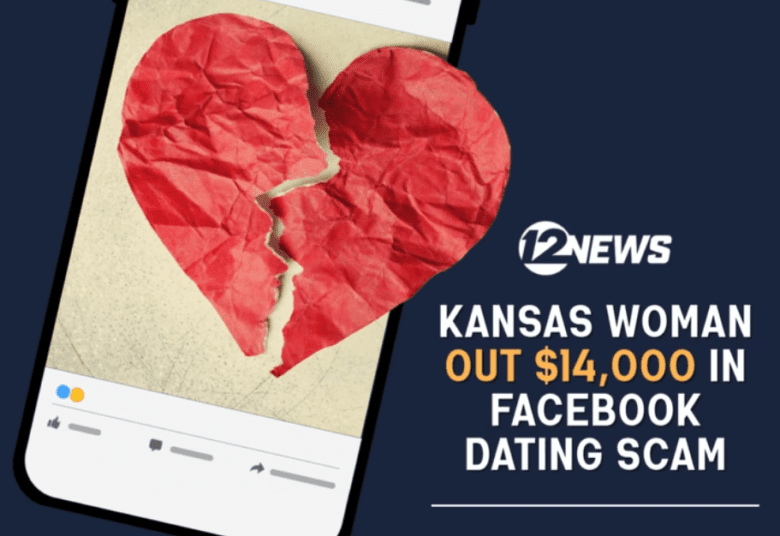Kansas Woman Loses $14,000 in Facebook Dating Scam: A Cautionary Tale for Online Romance
In a story that has captured attention across Kansas, a woman’s search for connection and companionship led her into the grip of a costly and emotionally devastating dating scam. According to KWCH 12 News, a 60-year-old woman from Salina thought she had met the right person when she connected with a man she met through Facebook in late 2023.
This wasn’t just any story — Salina police confirmed a report and the Salina Post that a woman lost nearly $15,000 in what appeared to be a carefully planned romantic fraud. The report from the Salina Post detailed how the man she met online claimed to be from Kansas City, adding a false sense of familiarity and trust.
He was convincing, polite, and attentive. He said all the right things, listened closely, and appeared to genuinely care. What she didn’t know was that behind the charming facade was someone who planned to take one’s money, not their heart.
The Timeline of the Scam: How It Happened
Initial Contact and Emotional Bonding
The scam began in November 2023 when the woman met a man on Facebook who claimed to be a business professional living in Kansas City. They quickly developed what she believed to be a real emotional connection. He said all the right things, calling her beautiful, intelligent, and special. Within days, they were exchanging long messages and daily calls.
The Trip to Malaysia
Shortly after New Year’s, he claimed he was going on a trip to Malaysia for a business opportunity. It was there, he allegedly encountered trouble. According to the woman, he said he was detained at the airport and needed money to pay for legal fees and customs clearance.
Believing she was helping someone she loved, she agreed to send him $10,000. It wouldn’t be the last transfer.
Money Transfers and Laundering
Over the next few weeks, she was convinced to send several smaller payments. Then came a strange twist: the scammer began depositing large sums into her bank account — more than $66,000 in total — and told her to forward that money to other accounts. This tactic is common in laundering operations where victims unknowingly assist in moving criminal funds.
By the time she stopped communication, her net loss totaled $14,694.
Psychological Tactics Used by Online Romance Scammers
Many people wonder how someone could fall for such a scheme. But those who have been scammed by a man online often describe a process of psychological manipulation that is difficult to recognize until it’s too late.
Love Bombing
Scammers often tell their victims that they’re special or the only ones who understand them. They overwhelm the target with compliments, promises of the future, and emotional support — what experts call “love bombing.”
Isolation
They may ask their victim to keep the relationship private, claiming their feelings are “too intense” to be shared publicly. This secrecy removes the victim from external reality checks.
Urgency and Guilt
In this case, the man she met convinced her that if she didn’t send the money immediately, he could be imprisoned or worse. Victims are made to feel responsible for the scammer’s well-being.
5 Red Flags of a Facebook Dating Scam
1. The Relationship Moves Too Fast
Scammers often express love or strong emotions early on. They escalate quickly to make the victim emotionally dependent before introducing a crisis.
2. They Avoid Meeting in Person
The man she met through Facebook never arranged a video call or an in-person meeting. He had excuses for everything — camera broken, network down, travel delays.
3. They Introduce Urgent Financial Problems
A sudden trip or detention abroad, like in Malaysia, is a common excuse to take one’s money. These stories are designed to bypass skepticism.
4. They Ask You to Receive or Move Money
When the scammer asked her to forward deposits to other accounts, it was a clear sign of fraud. This request turns the victim into an unwitting accomplice.
5. They Pressure You Not to Talk to Others
Secrecy and emotional manipulation go hand-in-hand. If you’re asked to keep things private, that’s a red flag.
How to Respond If You Suspect a Romance Scam
If you think you or someone you know is being targeted in a dating scam, act quickly:
- Cut off all communication with the individual immediately.
- Contact your bank to report suspicious transfers.
- File reports with the Federal Trade Commission and the FBI’s Internet Crime Complaint Center (IC3).
- Alert your local authorities — in this case, Salina police confirmed a report that helped prevent further damage.
- Save all communication for documentation purposes.
Support for Victims: You’re Not Alone
It’s important to understand that victims of online scams are not foolish — they are targeted by professional con artists who use tested strategies. Organizations like the AARP Fraud Watch Network offer guidance, support groups, and recovery plans.
Locally, news outlets like KWCH, KWCH 12 News, and WIBW help bring awareness to these incidents, empowering victims to come forward.
Why News Coverage Matters: KWCH 12 News and Salina Post
Without diligent reporting from outlets like KWCH12, the post that a woman lost money might never have reached public awareness. The KWCH 12 News and reports from the Salina Post were instrumental in alerting Kansans about this scam.
By sharing stories like this, they help prevent future crimes and encourage conversations that reduce shame and stigma.
How to Prevent Falling Victim to a Dating Scam
- Use reverse image search to confirm profile authenticity.
- Keep your guard up when someone asks for money online — especially if you’ve never met them.
- Talk to trusted friends or family before sending any financial support.
- Stay informed by reading verified sources like KWCH or the Salina Post.
Final Thoughts: A Cautionary Tale for Kansans and Beyond
This story of a Kansas woman being scammed by a man on Facebook serves as a stark reminder of how dangerous digital relationships can become when trust is exploited.
As more people seek companionship online, the risk of encountering a dating scam grows. But with awareness, education, and communication, these scams can be identified and stopped before they succeed.
If you or someone you know met a man online who is already asking for money, pause and ask the hard questions. Because the difference between finding love and losing everything could be just one message away.



